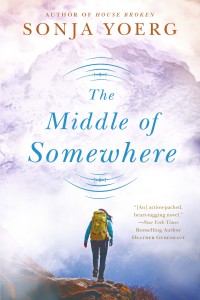On Facts in Fiction: Sinkholes and Breadcrumbs
 Merriam-Webster dictionary defines research as “the activity of getting information about a subject,” but every writer knows the true definition is “the squandering of eternities on the Internet under the guise of checking stuff.” Writers are a curious lot, so the invitation to explore a new city, an unusual job or a soap brand from 1943 is irresistible.
Merriam-Webster dictionary defines research as “the activity of getting information about a subject,” but every writer knows the true definition is “the squandering of eternities on the Internet under the guise of checking stuff.” Writers are a curious lot, so the invitation to explore a new city, an unusual job or a soap brand from 1943 is irresistible.
One minute you’re in the middle of a scene, at the edge of your desk chair, smoke pouring out of your ears, in the damn zone, and the next a tiny question wriggles to the surface: Did the 1972 Chevy Nova come in powder blue? Are there buttercups in Romania? What part of Russia can you really see from Alaska? The Chrome button on your toolbar expands to the size of a harvest moon and begins to glow. Google it Google it Google it…
An hour later, you’re looking at stateroom options on an Alaskan cruise.
(Or perhaps you are the less common species of writer who does not enjoy research. That’s okay. This is for you, too.)
I can’t help you with time management. There are plenty of helpful articles about it and I’m as good at ignoring all of them as you are. Instead, I’m here to say that research is a great way to spend your time. Research for your novel, not your cruise. Here’s why you should get your facts straight.
A telling detail, carefully placed, pins the reader to the page, a lot like the little yellow pegman on Google. Hey! We’re on the Brooklyn Bridge! If you want a scene to feel real (and I think we can agree this is a worthy goal), a single, specific detail works miracles. But work it in smoothly. Don’t do this: “Geez, Martha, that cherry coke sure looks refreshing!” Be subtle.
On the flip side, too many details are distracting, no matter how carefully researched. I know it’s normative in some genres to drop labels, but I want my readers in the story, not thinking about checking out whether those gladiator wedges are for sale at Zappos. A detail or two to establish character, or setting, or mood, then leave it alone. Less research for you!
If you include a detail, get it right. Every fact you don’t check is a potential sinkhole for the reader. Yeah, we can’t worry about what each reader is going to think, and some readers are really picky. (That’s the nice word.) Then again, your job as a writer is to make the story hang together, and facts are nails. I read a book set in 1959 that referred to Mannix, a TV show that didn’t come out until the late 60s. The error was sloppy and it bugged me. If you’re expecting your copy-editor to catch this sort of thing, think again. They might, but it’s your responsibility.
I was trained as a scientist and am a stickler for facts—to a nearly debilitating degree. For example, I use real calendars in my stories. If the full moon is on the 8th, that’s when it is, unless I absolutely need it to be a week later, in which case I flag the reference to make sure it’s not full again two weeks later. I find that staying close to reality can yield pleasant surprises. While writing my debut, I noticed the calendar showed Mother’s Day coming up, a fact that meshed perfectly with the plot.
 My second novel, Middle of Somewhere, takes place on a remote trail in the Sierra—one my husband and I hiked for eighteen days. Although few people would’ve noticed if I had moved a few mountains around, I kept to the truth, using the stack of trail maps we had relied on during the 18-day hike and the 800 photos my husband had taken.
My second novel, Middle of Somewhere, takes place on a remote trail in the Sierra—one my husband and I hiked for eighteen days. Although few people would’ve noticed if I had moved a few mountains around, I kept to the truth, using the stack of trail maps we had relied on during the 18-day hike and the 800 photos my husband had taken.
As I followed my characters along the trail, day after day, crossing the streams I had, scaling the same mountains, admiring the same vistas, they came alive for me in a new way. Because I insisted that the story conform to the detailed constraints and opportunities of the real world, my characters existed there, just as I had.
Getting your facts straight is vital to the sleight of pen that is fiction. More, it’s a way for a writer to more fully inhabit the world she creates, and thereby write with more confidence and conviction. If you are inside your story, your readers will follow you there with only a breadcrumb or two to guide them.
—
Sonja Yoerg grew up in Stowe, Vermont, where she financed her college education by waitressing at the Trapp Family Lodge. She earned her Ph.D. in Biological Psychology from the University of California at Berkeley and published a nonfiction book about animal intelligence, Clever as a Fox (Bloomsbury USA, 2001). Her novels, House Broken (January 2015) and Middle of Somewhere (September 2015) are published by Penguin/NAL. Sonja lives with her husband in the Shenandoah Valley of Virginia.
Find out more about Sonja on her website http://www.sonjayoerg.com/
Category: Contemporary Women Writers, How To and Tips
Comments (9)
Trackback URL | Comments RSS Feed
Sites That Link to this Post
- Tackling New Writing Challenges : Women Writers, Women's Books | October 29, 2015




























Great article, Sonja, and I heartily agree. For my second novel ( out in January) I went on a freighter to Hamburg! My heroine, Juliet, goes on a freighter from the UK to Australia. I had spoken to a lady who went on world trips by freighter. She even gave me her journals to read! But I knew I would have to experience it for myself.
Am so glad. Would never have understood so much. The smell, the size of the ship, the feel of the vibrations, the mingling with the crew, asking them question after question…
And a weird thing. As soon as I began to walk up the gangplank I became Juliet. I know I can say this to writers without fear of them sneering. It was magical. Only thing was, no love interest like the gorgeous chap in Juliet’s Story, as I was the only passenger 🙂
What a wonderful story! Sorry about the lack of gorgeous men, though. Sigh. The deprivations we writers must suffer. Congrats on your new release, Denise!
Such an interesting article, we have to strike a balance between informing and overwhelming but sometimes I do find myself in very strange by-ways…
Thanks, Catherine. Yes, those byways…but that’s part of the fun, right? Best of luck to you.
This is so true. I wrote much of my novel with a printout of the NYC transportation system so my characters didn’t take subways that didn’t exist. Though I am definitely one who can go off the rails and end up looking at the clothing styles they would have worn when all I had initially gone to search was “Did Oreos exist then?” It can be hard to stay focused!
Yes, Jennifer, research can be a time suck. But then again, writers should be allowed a little bit of unscheduled fun, right? Good luck with your work!
Thanks so much, Charlene. I think we are all susceptible to the internet lure and I wish I had some insight on how to curtail that. Glad you stopped by and thanks for commenting!
I love this so much! Mostly because I’m so glad I’m not the only one who takes myself out of the zone to do “just a minute” of internet research… 2 hours later… Oh, the internet is full of bright, shiny objects isn’t it.
And you are right, nothing will take me out of a story faster than facts or timetables that just don’t add up.
Great post!